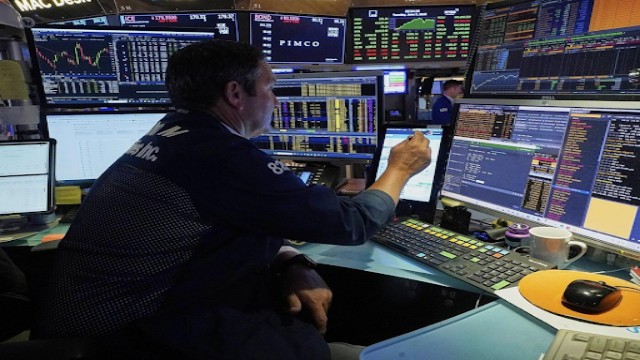
James Matthews, a trader at the New York Stock Exchange, is seen working on the trading floor on Tuesday, June 3, 2025. (AP Photo/Richard Drew)
Stock markets in the U.S. and Canada climbed higher on Tuesday, even as concerns about rising trade tensions continued to swirl. Investors appeared unfazed by the latest developments in the ongoing tariff dispute led by former U.S. President Donald Trump, choosing instead to stay focused on positive momentum in trade talks.
The Toronto Stock Exchange’s S&P/TSX composite index added 37.68 points, ending the day at 26,426.64. According to investment adviser Allan Small of iA Private Wealth, the Canadian market has lately been buoyed by gains in gold, energy, and financial stocks. Gold, in particular, tends to attract investors during uncertain economic times.
Meanwhile, south of the border, all major U.S. indices posted solid gains. The Dow Jones Industrial Average rose 214.16 points to 42,519.64. The S&P 500 climbed 34.43 points to 5,970.37, and the Nasdaq surged 156.34 points to 19,398.96. Despite aggressive talk from Trump about increasing tariffs on imported steel and aluminum, the markets held steady, showing surprising resilience.
“There’s a sense that the worst-case scenario may not happen,” Small explained. “Investors are assuming there’s still room for negotiation and are optimistic some sort of agreement can be reached.”
Trump had originally imposed 25% tariffs on steel and aluminum back in March. Last Friday, while visiting a steel plant, he proposed doubling those duties to 50%. This has raised concerns, especially in Canada — the largest exporter of steel to the U.S., supplying nearly a quarter of America’s imports last year.
Canadian officials are now in Washington to discuss the matter further. Meanwhile, White House press secretary Karoline Leavitt confirmed that Trump is preparing to sign an executive order raising those duties.
Despite the tough talk, Small said markets seem to be tuning out the political noise. “There’s always some drama,” he noted. “Trump makes a big demand, but he often backs off. Investors have caught on to that.”
In the U.S., tech giants like Apple, Meta, and Nvidia have been particularly sensitive to tariff developments. These stocks, which heavily influence market trends, tend to react quickly to trade news. So far, however, tech is holding up as talks between the U.S. and China continue.
Back in Canada, attention is also turning to the Bank of Canada’s upcoming interest rate decision, expected Wednesday. Small believes the bank will likely maintain current rates until it sees clearer economic indicators, particularly second-quarter GDP results.
Adding to the week’s economic picture, Statistics Canada will release its May jobs report on Friday. That data could offer more clues about the health of the country’s economy and influence future rate moves.
In currency markets, the Canadian dollar slipped slightly, closing at 72.87 cents U.S., down from 72.96 cents the day before.
Oil prices also rose, with the July crude contract gaining 89 cents to reach US$63.41 per barrel. Natural gas edged up to US$3.72. However, gold dipped by US$20.10, settling at US$3,377.10 per ounce, and copper fell two cents to US$4.83 a pound.















